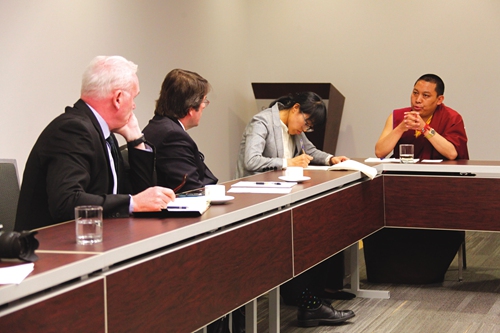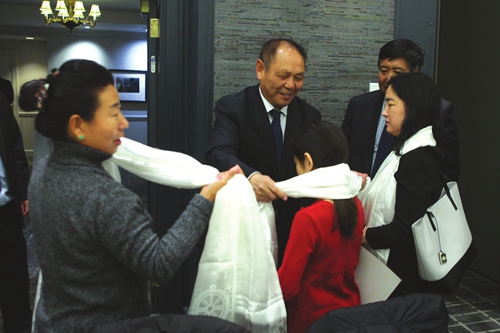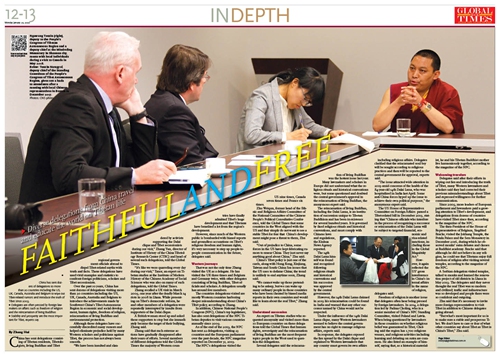HOME >> CHINA
Diverse delegations from China travel and educate the world on Tibetan life
By Zhang Hui Source:Global Times Published: 2020/1/19 20:18:40
○ China has sent dozens of delegations to more than 20 countries including the US, UK, Canada, Australia and Belgium to wipe out Tibet-related rumors and introduce the truth of Tibet since 2009
○ Delegates are often pressed by foreign lawmakers on affairs such as freedom of religion and the reincarnation of living Buddhas
○ Stability and prosperity are the most important for Tibet, experts say

Over the past 10 years, China has sent dozens of delegations visiting more than 20 countries including the US, UK, Canada, Australia and Belgium to introduce the achievements made by Southwest China's Tibet Autonomous Region in economic and social development, human rights, freedom of religion, reincarnation of living Buddhas and environmental protection.
Although those delegates have successfully discredited many rumors and helped eliminate prejudice held by many Western scholars and politicians against Tibet, the process has not always been smooth.
"We have been insulted and slandered by activists supporting the Dalai clique and Tibet secessionists during our visit," Zhang Yun, director of Institute of History of the China Tibetology Research Center (CTRC) and head of several such delegations, told the Global Times.
"It's like we were quarreling every day during our visit," Tanor, an expert on Tibetan studies at the Institute of Modern History of the Chinese Academy of Social Sciences who was also on many of such delegations, told the Global Times.
Zhang recalled a UK visit in March 2009, one year after the deadly March 14 riots in 2008 in Lhasa. While presenting on Tibet's democratic reform, he and other members of a delegation were repeatedly interrupted by insults from supporters of the Dalai clique.
A British woman stood up and asked these supporters to stop but she immediately became the target of their bullying, Zhang said.
Zhang said that such extreme actions have gradually disappeared after their years of efforts. Several members of different delegations told the Global Times the majority of Western countries have finally admitted Tibet's huge development and that Tibetans have benefited a lot from the region's development.
However, since much of the Western public is bombarded with biased reports and groundless accusations on Tibet's religious freedom and human rights, it's very necessary to step up people-to-people communication in the future, delegates said.
Western journeys
That was not the only time Zhang visited the UK as a delegate. He has visited the UK three times and Belgium and Germany twice, with other delegates consisting of living Buddhas, Tibet officials and scholars. A delegation usually has around five members.
The countries delegations visited are mostly Western countries harboring deeper misunderstanding about China's Tibet policy, according to Zhang.
In addition, Chinese National People's Congress (NPC), China's top legislature, has also sent delegations of the NPC Tibetan deputies to visit various countries annually since 2009.
As of the end of the 2019, the NPC has sent 22 delegations, visiting 23 countries and the European parliament over the past decade, the NPC magazine reported on December 31, 2019.
The NPC's delegations visited the US nine times, Canada seven times and France six times.
Zhu Weiqun, former head of the Ethnic and Religious Affairs Committee of the National Committee of the Chinese People's Political Consultative Conference, told the Global Times that some countries in the West aligned with the US and they simply do not want to see a stable Tibet for fear that China's development might pose a threat to them, Zhu said.
"Out of prejudice to China, some forces in the US have kept fabricating rumors to smear China. They just never say anything good about China," Zhu said.
China's Tibet policy is just one of the cards, along with Hong Kong, Xinjiang, Taiwan and South China Sea issues that the US uses to defame China; the trend is unlikely to end anytime soon, Zhang said.
"We cannot wake up those pretending to be asleep, but we can wake up many ordinary people in those countries who have been cheated by biased media reports in their own countries and would like to learn about the real Tibet," Zhang said.
Understand succession
An expert on Tibetan studies who requested anonymity and visited more than 10 European countries on these delegations told the Global Times that human rights, sovereignty and the reincarnation of living Buddhas are the most frequent topics people in the West used to question the delegations.
Several delegates said the reincarnation of living Buddhas was the hottest issue last year.
Many lawmakers and scholars in Europe did not understand what the religious rituals and historical conventions were, but some questioned and doubted the central government's approval in the reincarnation of living Buddhas, the anonymous expert said.

The 14th Dalai Lama himself was found and recognized following religious rituals and historical conventions and his succession was approved by the central government.
However, the 14th Dalai Lama claimed in 2019 his reincarnation could be found in India and warned that any other successor named by China would not be respected.
Under the influence of the 14th Dalai Lama clique, many Western lawmakers seemed to believe the central government has no right to manage religious affairs, experts said.
In response, the delegates exposed the lies spread by the Dalai clique and explained to Western lawmakers that any country must govern its own affairs including religious affairs. Delegates clarified that the reincarnated soul boy will be sought according to religious practices and then will be reported to the central government for approval, experts said.
"The issue attracted wide attention in 2019 amid concerns of the health of the 84-year-old 14th Dalai Lama, who was hospitalized in India last April. Some anti-China forces hyped up the issue to achieve their own political purposes," the anonymous expert said.
The US House of Representatives Committee on Foreign Affairs passed a Tibet-related bill in December 2019, stating that "Chinese officials who interfere in the process of recognizing a successor or reincarnation of the Dalai Lama will be subject to targeted financial, economic and visa-related sanctions, including those in the Global Magnitsky Act."
However, it again reflected the US' gross interference in China's internal affairs in the name of religion, delegates said.
Freedom of religion is another issue that delegates often hear being pressed by foreign lawmakers. In 2014, a delegation led by Padma Choling, who is a senior member of China's NPC Standing Committee, visited Poland and Latvia. When being questioned by lawmakers in those countries on whether religious belief was guaranteed in Tibet, Choling said the region has 1,700 religious venues, and religious activities including learning and debating on sutra are common. He also listed an example of himself, saying that, as a historical materialist, he and his Tibetan Buddhist mother live harmoniously together, according to the magazine of the NPC.
Welcoming travelers
Delegates said after their efforts in wiping out lies and introducing the truth of Tibet, many Western lawmakers and scholars said they had corrected their previous misunderstandings about Tibet and expressed willingness for further communication.
Since 2009, more leaders of European parliament and lawmakers paid a growing attention to Tibet's development, and delegations from dozens of countries have visited Tibet since then, according to the magazine of the NPC.
The then-President of the House of Representatives of Belgium, Siegfried Bracke, visited the Jokhang Temple, the Potala Palace and the Sera Monastery in December 2016, during which he observed monks' sutra debates and classes at Buddhist academy. Bracke said that although he did not believe in any religion, he could see that Tibetans enjoy full freedom of religion after visiting several temples, according to the magazine of the NPC.
A Serbian delegation visited temples, talked to monks and learned the renovation project of old districts in Lhasa in May 2019. The delegates said they never thought the real Tibet was so modern and civilized; traffic and infrastructure was so developed and people there were so confident and outgoing.
Zhu said that it's necessary to invite more foreign representatives to visit Tibet in addition to Chinese delegates going abroad.
"But what's most important for us is to make sure a stable and prosperous Tibet. We don't have to care or fear of what other countries say about Tibet as Tibet is China's Tibet," Zhu said.

Newspaper headline: Faithful and free
○ Delegates are often pressed by foreign lawmakers on affairs such as freedom of religion and the reincarnation of living Buddhas
○ Stability and prosperity are the most important for Tibet, experts say

Ngawang Tenzin (right), deputy to the People's Congress of Tibet Autonomous Region and a deputy chief at the Mindroling Monastery in Shannan city, meets with local individuals during a visit to Canada in May 2018. Photo: CNS photo
China has sent delegations consisting of Tibetan residents, Tibetologists, living Buddhas and Tibet regional government officials abroad to dispel Tibet-related myths with truth and facts. These delegations have used vivid examples and statistics to confront foreign politicians, scholars and Tibet secessionists.Over the past 10 years, China has sent dozens of delegations visiting more than 20 countries including the US, UK, Canada, Australia and Belgium to introduce the achievements made by Southwest China's Tibet Autonomous Region in economic and social development, human rights, freedom of religion, reincarnation of living Buddhas and environmental protection.
Although those delegates have successfully discredited many rumors and helped eliminate prejudice held by many Western scholars and politicians against Tibet, the process has not always been smooth.
"We have been insulted and slandered by activists supporting the Dalai clique and Tibet secessionists during our visit," Zhang Yun, director of Institute of History of the China Tibetology Research Center (CTRC) and head of several such delegations, told the Global Times.
"It's like we were quarreling every day during our visit," Tanor, an expert on Tibetan studies at the Institute of Modern History of the Chinese Academy of Social Sciences who was also on many of such delegations, told the Global Times.
Zhang recalled a UK visit in March 2009, one year after the deadly March 14 riots in 2008 in Lhasa. While presenting on Tibet's democratic reform, he and other members of a delegation were repeatedly interrupted by insults from supporters of the Dalai clique.
A British woman stood up and asked these supporters to stop but she immediately became the target of their bullying, Zhang said.
Zhang said that such extreme actions have gradually disappeared after their years of efforts. Several members of different delegations told the Global Times the majority of Western countries have finally admitted Tibet's huge development and that Tibetans have benefited a lot from the region's development.
However, since much of the Western public is bombarded with biased reports and groundless accusations on Tibet's religious freedom and human rights, it's very necessary to step up people-to-people communication in the future, delegates said.
Western journeys
That was not the only time Zhang visited the UK as a delegate. He has visited the UK three times and Belgium and Germany twice, with other delegates consisting of living Buddhas, Tibet officials and scholars. A delegation usually has around five members.
The countries delegations visited are mostly Western countries harboring deeper misunderstanding about China's Tibet policy, according to Zhang.
In addition, Chinese National People's Congress (NPC), China's top legislature, has also sent delegations of the NPC Tibetan deputies to visit various countries annually since 2009.
As of the end of the 2019, the NPC has sent 22 delegations, visiting 23 countries and the European parliament over the past decade, the NPC magazine reported on December 31, 2019.
The NPC's delegations visited the US nine times, Canada seven times and France six times.
Zhu Weiqun, former head of the Ethnic and Religious Affairs Committee of the National Committee of the Chinese People's Political Consultative Conference, told the Global Times that some countries in the West aligned with the US and they simply do not want to see a stable Tibet for fear that China's development might pose a threat to them, Zhu said.
"Out of prejudice to China, some forces in the US have kept fabricating rumors to smear China. They just never say anything good about China," Zhu said.
China's Tibet policy is just one of the cards, along with Hong Kong, Xinjiang, Taiwan and South China Sea issues that the US uses to defame China; the trend is unlikely to end anytime soon, Zhang said.
"We cannot wake up those pretending to be asleep, but we can wake up many ordinary people in those countries who have been cheated by biased media reports in their own countries and would like to learn about the real Tibet," Zhang said.
Understand succession
An expert on Tibetan studies who requested anonymity and visited more than 10 European countries on these delegations told the Global Times that human rights, sovereignty and the reincarnation of living Buddhas are the most frequent topics people in the West used to question the delegations.
Several delegates said the reincarnation of living Buddhas was the hottest issue last year.
Many lawmakers and scholars in Europe did not understand what the religious rituals and historical conventions were, but some questioned and doubted the central government's approval in the reincarnation of living Buddhas, the anonymous expert said.

Tenzin Namgyal, deputy chief of the Standing Committee of the People's Congress of Tibet Autonomous Region, gives out a hada to attendants after a meeting with local Chinese representatives in Boston in December 2017. Photo: CNS photo
The reincarnation of living Buddhas, including the Dalai Lama, is an institution of succession unique to Tibetan Buddhism and has been in existence for several hundred years. It is governed by fixed religious rituals and historical conventions, and must comply with Chinese laws and regulations, the Xinhua News Agency reported.The 14th Dalai Lama himself was found and recognized following religious rituals and historical conventions and his succession was approved by the central government.
However, the 14th Dalai Lama claimed in 2019 his reincarnation could be found in India and warned that any other successor named by China would not be respected.
Under the influence of the 14th Dalai Lama clique, many Western lawmakers seemed to believe the central government has no right to manage religious affairs, experts said.
In response, the delegates exposed the lies spread by the Dalai clique and explained to Western lawmakers that any country must govern its own affairs including religious affairs. Delegates clarified that the reincarnated soul boy will be sought according to religious practices and then will be reported to the central government for approval, experts said.
"The issue attracted wide attention in 2019 amid concerns of the health of the 84-year-old 14th Dalai Lama, who was hospitalized in India last April. Some anti-China forces hyped up the issue to achieve their own political purposes," the anonymous expert said.
The US House of Representatives Committee on Foreign Affairs passed a Tibet-related bill in December 2019, stating that "Chinese officials who interfere in the process of recognizing a successor or reincarnation of the Dalai Lama will be subject to targeted financial, economic and visa-related sanctions, including those in the Global Magnitsky Act."
However, it again reflected the US' gross interference in China's internal affairs in the name of religion, delegates said.
Freedom of religion is another issue that delegates often hear being pressed by foreign lawmakers. In 2014, a delegation led by Padma Choling, who is a senior member of China's NPC Standing Committee, visited Poland and Latvia. When being questioned by lawmakers in those countries on whether religious belief was guaranteed in Tibet, Choling said the region has 1,700 religious venues, and religious activities including learning and debating on sutra are common. He also listed an example of himself, saying that, as a historical materialist, he and his Tibetan Buddhist mother live harmoniously together, according to the magazine of the NPC.
Welcoming travelers
Delegates said after their efforts in wiping out lies and introducing the truth of Tibet, many Western lawmakers and scholars said they had corrected their previous misunderstandings about Tibet and expressed willingness for further communication.
Since 2009, more leaders of European parliament and lawmakers paid a growing attention to Tibet's development, and delegations from dozens of countries have visited Tibet since then, according to the magazine of the NPC.
The then-President of the House of Representatives of Belgium, Siegfried Bracke, visited the Jokhang Temple, the Potala Palace and the Sera Monastery in December 2016, during which he observed monks' sutra debates and classes at Buddhist academy. Bracke said that although he did not believe in any religion, he could see that Tibetans enjoy full freedom of religion after visiting several temples, according to the magazine of the NPC.
A Serbian delegation visited temples, talked to monks and learned the renovation project of old districts in Lhasa in May 2019. The delegates said they never thought the real Tibet was so modern and civilized; traffic and infrastructure was so developed and people there were so confident and outgoing.
Zhu said that it's necessary to invite more foreign representatives to visit Tibet in addition to Chinese delegates going abroad.
"But what's most important for us is to make sure a stable and prosperous Tibet. We don't have to care or fear of what other countries say about Tibet as Tibet is China's Tibet," Zhu said.

Newspaper headline: Faithful and free